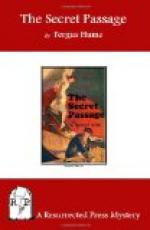“Yes, I do see,” almost shouted Jennings, “and I’ll bag the whole lot.”
“What are you talking about, sir?”
“Ah, I forgot you don’t know,” said the detective subsiding, “I’ll tell you later. But you have made a discovery, Susan. This plan shows a secret entrance into Rose Cottage.”
“I know it does, sir, and I thought Miss Saxon would like to see it. I don’t know what Miss Loach wanted with a secret entrance, though.”
“I fancy I do,” said Jennings, rolling up the plans. “Your father was a very clever man, Susan. Too clever for some people. He made this secret entrance when the new wing of the cottage was built five years ago, and those who employed him gave him arsenic by way of a reward. Tyke died of arsenic also, so they are carrying on the same game.”
“Oh dear, oh dear!” wept Susan, not hearing the latter part of the sentence. “So father was poisoned after all. Who did it, sir?”
“I can’t tell you that,” said Jennings, becoming cautious. “You had better say nothing about this, Susan, till I give you leave. You have done Mr. Mallow a great service. These plans may lead to a discovery of the murderer.”
“And then Miss Saxon will marry Mr. Mallow.”
“Yes. Will you be sorry?”
“No, Mr. Jennings. I am quite satisfied with my baker.”
“Then I tell you what, Susan. Lord Caranby has offered a reward for the detection of the murderer. If these plans lead to his detection, you will receive a sufficient sum to set up in business.”
CHAPTER XX
BASIL
While Jennings was thus working at the case, and hoping to bring it to a successful issue, Cuthbert was resting in the happy belief that no further steps were being taken. The detective had appeared so despondent when Mallow called with Caranby that the former thought with some show of reason that he meant what he said. Had he known that Jennings was still active he would have been much disturbed.
Agreeably to Cuthbert’s suggestion, Juliet had offered the money of Miss Loach to her mother. But Mrs. Octagon refused to be bribed—as she put it—into consenting to the match. In the presence of Mallow himself, she expressed the greatest detestation for him and for his uncle, and told Juliet she would never acknowledge her as a daughter if she married the young man. The poor girl was thus between two fires—that of her love for Cuthbert, and that of her mother’s hearty hatred for the Earl and his nephew. Under the circumstances Cuthbert thought it best to remain away from the “Shrine of the Muses” for a time until Mrs. Octagon could be brought to see reason. But she was so obstinate a woman that it was doubtful if she would ever behave in, an agreeable manner. Cuthbert returned to his rooms in a rather low state of mind. He knew that Juliet, whatever happened, would remain true to him, and had quite hoped to bribe Mrs. Octagon into consenting by means of the inherited money. But now things seemed more hopeless than ever. Juliet, although not very fond of her mother, was a devoted daughter from a sense of duty, and it would be difficult to bring her to consent to a match against which the elder woman so obstinately set her face.




